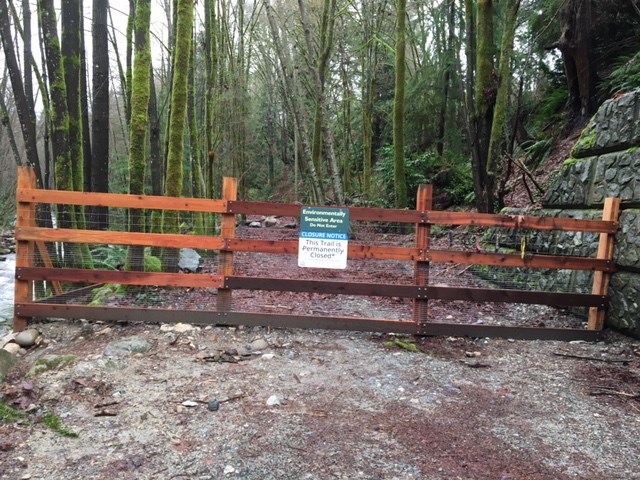A trail in Mosquito Creek Park has been permanently closed by the City of North Vancouver, with the municipality saying it was “never really open” in the first place.
The park, at Fell Avenue and 16th Street, is the starting point for the Mosquito Creek trails, which follow the Mosquito Creek Ravine up Grouse Mountain to where the power lines cross the creek.
A city spokeswoman said the “rudimentary trail,” which is beyond the 19th Street trailhead on the east side of the creek, was "never constructed or maintained by the city or the District of North Vancouver because it’s within an environmentally sensitive riparian area."
"The south end was more formally closed by the city in 2007 following the slope stability assessment of the east side of the Mosquito Creek Ravine and resulting geotechnical concerns,” said Stephanie Smiley, City of North Vancouver communications officer.
Smiley said the initial fencing and signage installed at the city end in 2007 was regularly vandalized, and in late December it was replaced with a new fence and updated signs. The area has also had ongoing slope stability concerns and was the site of a small landslide a year ago.
Michele Gaudette, a North Vancouver resident who has used the east trail for the past decade, said she was extremely disappointed the trail had been closed without community consultation.
“Every day for the past ten years my dog and I have walked/hiked the Mosquito Park trail loop starting at the east side bottom, up beyond the Highway 1 underpass, crossed over the bridge at the top and looped back down the west side,” she explained in a letter to North Shore News.
Gaudette hoped the city would consider “remedial work on the parts of the slopes that necessitate it” instead of just closing the trail, which she says she has never felt unsafe on.
"The slide that happened last year started in the backyard of one of the houses on the eastside ridge so why not fix the problem as opposed to closing access to the entire trail?" she questioned.
While the trail has been used by community members for many years, Smiley said "the trail was never really open."
She said the city and the district completed a trail planning process for the park in 1999 and the establishment of a formal connection on the east side of the creek was considered, but following consultation with the community, North Shore Streamkeepers and Fisheries and Oceans Canada, it was determined that such work would have a significant impact on the streamside habitat and endanger local fish populations.
"Environmental best practices for new trail construction require significant setbacks from creeks, and wherever possible, require limiting access through these areas to only one side," Smiley said.
Smiley said neither the city nor the district supported formalising an east side trail because of the environmental and slope stability concerns.
Elisia Seeber is the North Shore News’ Indigenous and civic affairs reporter. This reporting beat is made possible by the Local Journalism Initiative.




